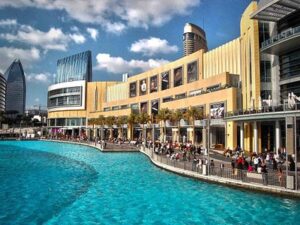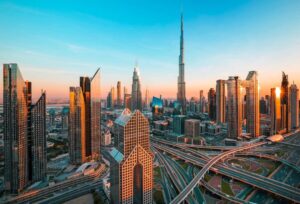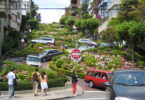Introduction
Synonymous with luxury and modernity, the name Dubai stands as a beacon of progress in the heart of the Arabian Desert. Its vibrant city has gained global recognition for its soaring skyscrapers, luxury resorts and bustling economy. But amidst its glittering skyline there is a question that often puzzles many: is Dubai a country or a city?
As we move into this fascinating discussion, it is important to understand Dubai’s multifaceted identity. While it may be tempting to categorize Dubai simply as a city, its significance transcends traditional definitions. Dubai is not just a collection of buildings and roads; It is a dynamic component of the aspirations of the region as a whole.
Understanding the geography and history of Dubai
An overview of Dubai’s location within the United Arab Emirates (UAE).
Located on the southeast coast of the Arabian Sea, Dubai is strategically located within the United Arab Emirates (UAE). Bordered by the Persian Gulf to the north, Dubai shares its southern border with the emirate Abu Dhabi. Its location puts it at the crossroads of trade routes connecting Europe, Asia and Africa.
Political Structure and Governance
Explanation of the UAE’s Federal System and Its Implications for Dubai
The United Arab Emirates (UAE) operates under a federal system of governance, where power is divided between the federal government and individual emirates. This structure allows each emirate, including Dubai, to retain a degree of autonomy while participating in a unified national framework.
- The federal government oversees matters of national importance, such as foreign affairs, defense, and monetary policy.
- Individual emirates, including Dubai, have their own local governments responsible for managing internal affairs, infrastructure, and public services.
- This division of authority enables Dubai to pursue policies tailored to its unique needs while contributing to the overall development and stability of the UAE.
Dubai’s unique governance structure: Rulers, government and business departments
Dubai’s governance structure is characterized by a combination of traditional leadership and modern governance practices.
- At the top of Dubai’s political hierarchy is the ruling family, headed by a hereditary ruler called the sheikh or emir.
- The ruler exercises authority and sets the direction for Dubai’s development, supported by a council of advisers and cabinet
- Dubai’s government leads through ministries and departments, implementing policies and managing day-to-day operations, including areas such as health, education and infrastructure
- Administrative units within Dubai, such as counties and municipalities, play an important role in ensuring service delivery and local governance.
Legal status in Dubai
An examination of the legal status of Dubai as a city-state within the UAE
Dubai’s legal status within the United Arab Emirates (UAE) is characterized by its role as a functional city-state within a national framework.
- Although Dubai is one of the seven emirates that make up the UAE, it operates as a separate entity with its own legal system.
- The UAE Constitution defines the division of powers between the federal government and individual emirates, giving Dubai local government greater autonomy
Clarification of Dubai’s autonomy and sovereignty
Dubai rules over a wide range of domestic issues, e.g.
- Application of civil and criminal law
- Coordination of business activities
- Public services such as education, health and transportation
- Developing and implementing urban planning and infrastructure plans
While Dubai adheres to governmental regulations set by the UAE government, it also reserves the right to enact rules and regulations in line with its specific needs and priorities.
Discussion on How Dubai’s Status Impacts Its Economy and Cultural Scene
- Dubai’s status as a global business and tourism destination has fueled its economic prosperity, attracting millions of visitors and generating revenue across various industries.
- The city’s reputation for innovation and entrepreneurship has led to the establishment of thriving startups and multinational corporations.
- Dubai’s cultural scene reflects its dynamic and inclusive ethos, with initiatives promoting arts, education, and intercultural exchange.
Comparison with Other Global Cities
Comparative Analysis of Dubai with Other Major Global Cities
- Dubai, often dubbed the “City of Gold,” shares similarities and differences with other major global cities like New York, London, and Singapore.
- While each city possesses unique characteristics, they all serve as centers of commerce, culture, and innovation on the global stage.
Analysis of similarities and differences in governance, economics, and cultures
- In terms of governance, the Dubai model combines elements of authoritarian rule and modern governance practices, differing from the more democratic systems found in cities such as New York and London
- Economically, Dubai’s reliance on sectors such as finance, tourism and real estate mirrors that of cities such as Singapore, known for its diverse financial products and global connectivity
- Culturally, Dubai’s cosmopolitan and immigrant population shares similarities with cities like London, which are known for their multiculturalism and inclusiveness
Eliminating corruption in general
Identify and explain common mistakes about the situation in Dubai
- Myth: Dubai is a country.
○ Fact: Dubai is one of the seven emirates of the United Arab Emirates (UAE), and is not an independent country.
- Myth: Dubai is all desert.
○ Fact: Despite having vast areas of desert, Dubai has modern urban areas, green parks and beaches.
- Myth: Dubai is a conservative Muslim country with strict rules.
○ Fact: Although Dubai adheres to Islamic principles, it is known for its tolerance and multiculturalism, allowing non-Muslims to practice their faith and enjoy cultural activities.
The impact of Dubai’s position on the tourism industry
An examination of how the environment in Dubai affects tourist attitudes and tourist perceptions
- Dubai’s position as a global city and tourist destination attracts millions of visitors every year.
- The city’s iconic landmarks, such as the Burj Khalifa and the Palm Jumeirah, attract tourists seeking luxury experiences and architectural marvels.
- Dubai’s reputation for safety, hospitality and world-class amenities makes it a popular destination for travelers from all over the world.
An analysis of Dubai as a business hub and investment destination
- Dubai’s strategic location between East and West makes it a gateway to international trade and commerce.
- The city’s free business zones, favorable tax policies and simplified business regulations attract multinational companies and entrepreneurs.
- Dubai’s reputation for innovation and entrepreneurship creates a dynamic business environment, fostering growth across sectors, including finance, technology and logistics.
Insight into how Dubai’s political stability and infrastructure contribute to its charm
- Dubai’s political stability and visionary leadership provide an ideal environment for business growth and investment.
- The city’s modern infrastructure, including state-of-the-art transport infrastructure and telecommunications systems, facilitates communication and efficiency.
- Dubai’s commitment to sustainable development and green building enhances its reputation as a forward-thinking and environmentally conscious city.
Legal Implications for Residents and Expatriates
Discussion on Legal Rights and Responsibilities of Residents and Expatriates in Dubai
- Residents and expatriates in Dubai are entitled to certain legal rights and are expected to fulfill specific responsibilities.
- These rights and responsibilities are outlined in various laws and regulations enforced by the Dubai government.
- Examples of rights include the right to live and work in Dubai, access to healthcare and education, and protection against discrimination.
- Responsibilities may include obeying local laws, paying taxes, respecting cultural norms, and contributing positively to the community.
Overview of Residency Laws, Visa Regulations, and Property Ownership Rules
- Residency laws in Dubai dictate the conditions under which individuals can reside in the emirate, including requirements for obtaining residency visas.
- Visa regulations govern the entry and stay of foreign nationals in Dubai, with different types of visas available for tourists, workers, investors, and family members.
- Property ownership rules in Dubai allow expatriates to purchase certain types of real estate in designated areas, subject to specific conditions and restrictions.
Examination of How Dubai’s Legal Status Affects Expatriate Communities and Foreign Investors
- Dubai’s legal status as part of the UAE influences the rights and protections afforded to expatriate communities and foreign investors.
- The stability of Dubai’s legal system and adherence to international legal standards contribute to its attractiveness as a destination for expatriates and investors.
- However, certain legal limitations and cultural differences may pose challenges for expatriates and foreign investors navigating the legal landscape in Dubai.
Future Prospects and Challenges
Exploration of Potential Future Developments in Dubai’s Political and Legal Landscape
- Dubai’s political and legal landscape is expected to evolve in response to changing global dynamics and internal pressures.
- Future developments may include reforms aimed at enhancing transparency, accountability, and inclusivity in governance.
- Legal frameworks could be revised to attract more foreign investment, promote sustainable development, and address emerging issues such as cybersecurity and data privacy.
Identification of Challenges and Opportunities for Dubai’s Continued Growth and Development
- Challenges:
○ Economic Diversification: Dubai faces the challenge of diversifying its economy away from oil dependency and further developing knowledge-based industries.
○ Sustainability: Managing rapid urbanization and addressing environmental concerns, such as water scarcity and air pollution, are critical for sustainable development.
○ Social Cohesion: Ensuring social inclusion and addressing income inequality are essential for maintaining stability and harmony in a diverse society.
- Opportunities:
○ Innovation: Dubai’s focus on innovation and technology presents opportunities for fostering entrepreneurship, attracting talent, and driving economic growth.
○ Infrastructure Development: Continued investments in infrastructure projects, such as transportation and utilities, will enhance connectivity and support future development initiatives.
○ Tourism and Hospitality: Expanding tourism offerings, improving hospitality services, and hosting major events can stimulate economic activity and create employment opportunities.
Analysis of How Geopolitical Factors May Impact Dubai’s Status in the Long Term
- Geopolitical factors, including regional conflicts, global economic trends, and shifts in diplomatic relations, may influence Dubai’s status as a global city.
- Economic alliances, trade agreements, and geopolitical tensions can affect Dubai’s trade links, investment flows, and geopolitical significance.
- Dubai’s ability to navigate geopolitical challenges, maintain political stability, and adapt to changing circumstances will be crucial for safeguarding its position as a leading hub for business, tourism, and innovation.
Expert opinion and insight
Interviews or quotes from UAE political, economic and cultural experts
- Interacting with experts in various fields provides valuable insights into the status and importance of Dubai.
- UAE political experts can provide insight into the Emirate governance structure and its role in the wider UAE.
- Economists can analyze Dubai’s economic structure, growth potential and challenges in economic transformation.
- Cultural experts can shed light on Dubai’s multicultural identity, social dynamics and efforts to preserve cultural heritage in the face of rapid development.
Incorporating expert research to provide in-depth insights into Dubai’s status and significance
- Expert research enriches the discussion by providing nuanced perspectives and informed interpretation.
- Expert opinion provides readers with a deeper understanding of Dubai’s political, economic and cultural landscape.
- Expert analysis can reveal emerging trends, potential risks and opportunities shaping the future course of Dubai.
Perspectives from academics, government officials, and business leaders
- Scholars contribute theoretical frameworks, empirical research, and critical analysis of the discussion.
- Management provides direct insight into policy development, regulatory framework and strategic priorities.
- Industry leaders will provide practical insights based on their experiences in areas such as finance, tourism, technology and real estate.
conclusion
In conclusion, understanding the political and legal context of Dubai is crucial to dispel misconceptions and appreciate its role within the UAE. Dubai enjoys a degree of autonomy, but operates within the confines of the federal government, shaping the experiences of residents, visitors and businesses alike The recognition that Dubai’s smaller base empowers individuals is Emirates and its dynamism is well connected with the growing in scope UAE land Can appreciate identity







